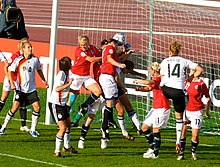|
UEFA Women's Championship
The UEFA European Women's Championship, also called the UEFA Women's Euro, held every four years and one year after the men's UEFA European Championship first held in 1984, is the main competition in women's association football between national teams of the UEFA confederation. The competition is the women's equivalent of the UEFA European Championship. The reigning champions are England, who won their home tournament in 2022. The most successful nation in the history of the tournament is Germany, with eight titles. History[1] In 1957 in West Berlin, a European Championship was staged by the International Ladies Football Association.[2][3] Four teams, representing West Germany, the Netherlands, Austria, and the eventual winners, England, played the tournament at the Poststadion,[2][3] at a time when women's football teams were officially forbidden by the German Football Association, a ban that was widely defied.[4] The FICF, which eventually merged into the Italian Football Federation, organised a European tournament in Italy in 1969 for women's national teams, a tournament won by the home team, Italy, who beat Denmark 3–1 in the final.[5] The two nations were also the finalists of the 1970 Women's World Cup in Italy. Italy hosted another European women's tournament a decade later, the 1979 European Competition for Women's Football – won by Denmark.[6] UEFA displayed little enthusiasm for women's football and were particularly hostile to Italy's independent women's football federation. Sue Lopez, a member of England's squad, contended that a lack of female representation in UEFA was a contributory factor:[7]
At a conference on 19 February 1980 UEFA resolved to launch its own competition for women's national teams.[8] The meeting minutes had registered the 1979 competition as a "cause for concern".[9] The first UEFA-run international tournament began only in 1982, when the 1984 European Competition for Women's Football qualification was launched. The 1984 Finals were won by Sweden. Norway won the 1987 Finals. Since then, the UEFA Women's Championship has been dominated by Germany, which has won eight out of ten events. Norway won in 1993 and the Netherlands in 2017. Germany's 2013 win had been their sixth in a row. In 2022, England won UEFA Women's Euro 2022, becoming the country's first senior association football team of either gender to win a major tournament since the men's team won the 1966 FIFA World Cup. From 1984 to 1995, the tournament was initially played as a four-team event. The 1997 edition was the first that was played with eight teams, followed by the 2001 and 2005 editions. The third expansion happened between 2009 and 2013 when 12 teams participated. From 2017 onwards 16 teams compete for the championship.[10] The first three tournaments of the UEFA competition in the 1980s had the name "European Competition for Representative Women's Teams". With UEFA's increasing acceptance of women's football, this competition was given European Championship status by UEFA around 1990.[11] Only the 1991 and 1995 editions have been used as European qualifiers for a FIFA Women's World Cup; starting in 1999, women's national teams adopted the separate World Cup qualifying competition and group system used in men's qualifiers. ResultsSummary
Medal tableIn the inaugural 1984 tournament, no bronze medal was awarded. In 1987, 1989, 1991 and 1993 there was a third-place play-off to determine bronze. From 1995 onwards, both losing semi-finalists are awarded bronze. Only Norway and Germany have won the competition more than once.
Debut of teams 
Overall team recordsIn this ranking 3 points are awarded for a win, 1 for a draw and 0 for a loss. As per statistical convention in football, matches decided in extra time are counted as wins and losses, while matches decided by penalty shoot-outs are counted as draws. Teams are ranked by total points, then by goal difference, then by goals scored.
Team results by tournamentLegend
For each tournament, the number of teams in each finals tournament (in brackets) are shown.
Notes:
Hosts
Results of defending finalists
Tournament statisticsAll-time top scorers
Top scorers by tournament
UEFA.com Golden Player by tournament
1Official player of the tournament since 2013 Highest attendances
See alsoWikimedia Commons has media related to UEFA Women's Championship.
Notes
References
External linksWikimedia Commons has media related to UEFA Women's Championship. |
|||||||||||||||||||||||||||||||||||||||||||||||||||||||||||||||||||||||||||||||||||||||||||||||||||||||||||||||||||||||||||||||||||||||||||||||||||||||||||||||||||||||||||||||||||||||||||||||||||||||||||||||||||||||||||||||||||||||||||||||||||||||||||||||||||||||||||||||||||||||||||||||||||||||||||||||||||||||||||||||||||||||||||||||||||||||||||||||||||||||||||||||||||||||||||||||||||||||||||||||||||||||||||||||||||||||||||||||||||||||||||||||||||||||||||||||||||||||||||||||||||||||||||||||||||||||||||||||||||||||||||||||||||||||||||||||||||||||||||||||||||||||||||||||||||||||||||||||||||||||||||||||||||||||||||||||||||||||||||||||||||||||||||||||||||||||||||||||||||||||||||||||||||||||||||||||||||||||||||||||||||||||||||||||||||||||||||||||||||||||||||||||||||||||||||||||||||||||||||||||||||||||||||||||||||||||||||||||||||||||||||||||||||||||||||||||||||||||||||||||||||||||||||||||||||||||||||||||||||||||||||||||||||||||||||||||||||||||||||||||||||||||||||||||||||||||||||||||||||||||
